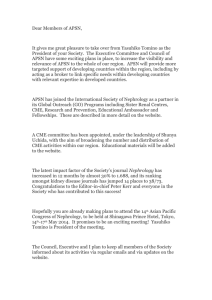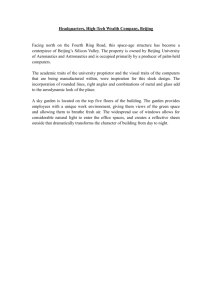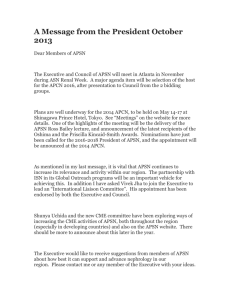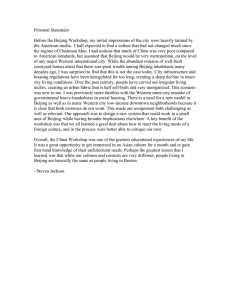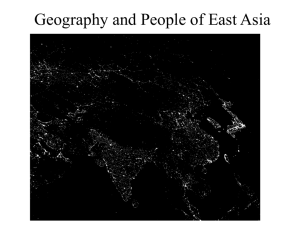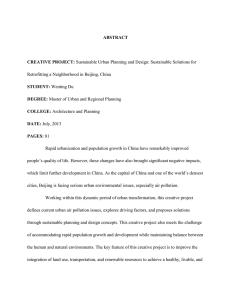On the Third APSN Conference in Beijing 2010 Xue Ling
advertisement
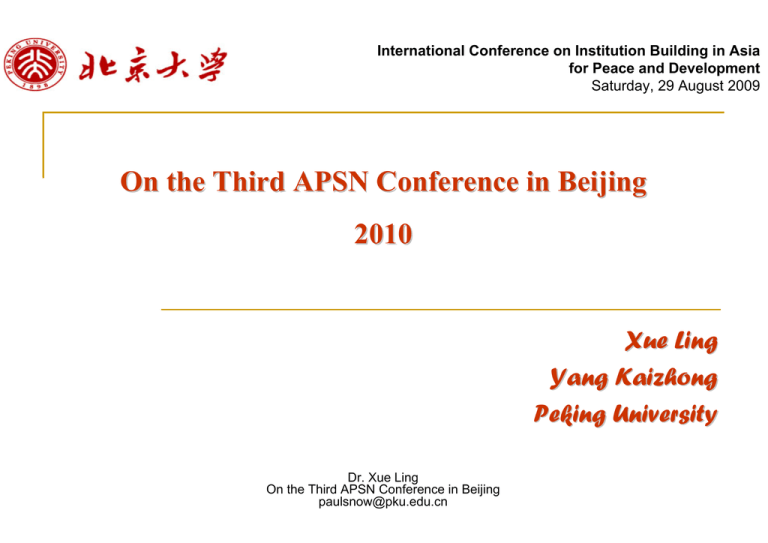
International Conference on Institution Building in Asia for Peace and Development Saturday, 29 August 2009 On the Third APSN Conference in Beijing 2010 Xue Ling Yang Kaizhong Peking University Dr. Xue Ling On the Third APSN Conference in Beijing paulsnow@pku.edu.cn Dr. Xue Ling, On the Third APSN Conference in Beijing, paulsnow@pku.edu.cn Outline Introduction Emerging Regional Profile of Peace and Development in Asia Why China and Beijing Beijing, 2010 Dr. Xue Ling, On the Third APSN Conference in Beijing, paulsnow@pku.edu.cn Introduction z Today, the world is changing so fast that there is no time to delay the acceleration of social and economic development. z In Asia, the economic performance of many developing countries has been quite satisfactory in the past decade. z Among many conditions which have contributed to this achievement, the most important one would, no doubt, be the peace which has been governing most of the countries in this region. zMany countries in Asia have became aware of the vital importance of international peace and development. z However, at the beginning of the twentieth century, we are still living in the difficult, troubled and fractured economic and political world. z Since last year, remarkable progress has been made in the direction of peace and the signs of hope glow more brightly. Dr. Xue Ling, On the Third APSN Conference in Beijing, paulsnow@pku.edu.cn Introduction z Peace science, which is aimed at studying how to control violence and crisis, is expected to give to more critical and deep insight and broader perspectives so that we could better control violence, settle conflicts, cope with crisis in peaceful manner instead of resorting to arms. z APSN is the achievement of peace and development in Asia. APSN’s initiative in organizing ibis Symposium is an important step in promoting exchange of information among researchers from different countries. z The first conference at Bali-Indonesia was successfully held with diverse participants of academics, professionals and bureaucrats from Asia, Europe and the United States. This year, the second annual International Conference of APSN is held successfully in Tokyo. The common theme of the Conference is “Institution Building in Asia for Peace and Development. z Looking forward to seeing all of you in the third APSN conference in Beijing Dr. Xue Ling, On the Third APSN Conference in Beijing, paulsnow@pku.edu.cn Emerging Regional Profile of Peace and Development in Asia z Asia has contributed to the global consensus on the desirability of peace and development. z Thinkers and scholars as well as activists in different countries are busy articulating this concern and searching alternative ways of conflict resolution and fostering solidarity among people of different religions and races, ethnic groups and nationalities. z This is being reflected in school curricula and in higher education, in campaigns for peace, and in research on peace related themes such as international, regional and domestic conflicts, violence, poverty and underdevelopment, ecological crisis and global survival. z It is only recent, from 1990s onwards, that research in peace science has begun to gain some prominence in Asia such as APSN. But the situation can best be described as a formative stage in terms of the following indicators: Dr. Xue Ling, On the Third APSN Conference in Beijing, paulsnow@pku.edu.cn Emerging Regional Profile of Peace and Development in Asia z There is a search for a special peace and development `perspective' and 'paradigm' on the one hand, and for a distinct ‘methodology' of peace research, on the other. z There is a move towards 'institutionalization’ of peace and development as an academic specialty through establishment of peace science association, publication of journals devoted exclusively or partly to peace science, and organization of seminars and conferences. z All Asian countries now commonly face a number of region-wide problems of critical importance, including the stability of financial and monetary system, further promotion of free trade and investment, support of less developed countries/regions, environmental and resource-energy problems, building regional infrastructures, as well as the issues of regional security. z In their attempts to give a distinct identity to peace science, scholars in Asia are tackling several epistemological and practical problems nowadays. Dr. Xue Ling, On the Third APSN Conference in Beijing, paulsnow@pku.edu.cn Why China and Beijing ? z To promote successfully the conditions for peace and development in Asia given such diversities, while surrounded by complex international relations, Asia needs to develop effectively the region-wide political and economic institutions by taking into account the multi-dimension of crisis and conflicts. We can find some answers and solutions in China. z Economic and political dimension z How should we evaluate the impact of the economic crisis conflicts upon the distribution of economic and political power within the international community? z How can individual states, both large and small in Asia, deal effectively with their own crises? z How effective have the various international mechanisms of cooperation been in coping with and reversing the global economic crisis and conflicts? z What role can and should China play in contributing to Asian cooperative efforts to find solutions to the economic crisis and conflicts? Dr. Xue Ling, On the Third APSN Conference in Beijing, paulsnow@pku.edu.cn Why China and Beijing ? z Social and cultural dimension z If we conduct an in-depth examination of the causes of the current economic crisis that has spread around the globe, we will find that the fault cannot be attributed solely to the financial institutions that have borne the major blame. z Indeed, the whole world witnessed the great success of the Asian countries as they managed to cope with seemingly insurmountable challenges and promote the harmonious development of their societies using the resources of the traditional wisdom of the East. z In the face of this global economic crisis, we hope to invite leading scholars in the social sciences and the humanities from around the world to discuss how we can draw upon our cultural traditions to find solutions to our common multi-facetted dilemma. Dr. Xue Ling, On the Third APSN Conference in Beijing, paulsnow@pku.edu.cn Why China and Beijing ? z Historical dimension z If the terms “development” can be used to describe the actual historical experience of human civilizations over the most recent centuries, then the word “crisis” needs equal space in our history books. z The history of the eastern and the western civilizations offers a wealth of examples on how to cope with various crises and conflicts, and we can learn valuable lessons through reviewing our past, both successfully and unsuccessfully. z More importantly, we need to explore ways in which we can transform major crises into opportunities for positive change that can help our various nations forge a better future and a more harmonious community in Asia. Dr. Xue Ling, On the Third APSN Conference in Beijing, paulsnow@pku.edu.cn Why China and Beijing ? z A land of Lao Tzu, Confucius and Sun Tzu, China is wedded to the philosophy of peace and there is a lengthy bibliography of work in this area. But not all of it is research in social scientific terms. z It is a time of reconsideration of eastern wisdom in light of the modern humanities. A key point touched on the role of peace movements in the history of China. It goes without saying that some research could be done on peace tradition in the history, literature, and culture in China. z As with any new specialty, peace science in Asia is carving out its territory and recruiting its membership. It is getting gradually institutionalized and gaining recognition within the academia and among the advocates of peace. It needs impetus. Dr. Xue Ling, On the Third APSN Conference in Beijing, paulsnow@pku.edu.cn Beijing 2010: International Conference on Peace and Development in Asia Co-organizers: Asian Peace Science Network Regional Science Association of China (RSAC) Dr. Xue Ling, On the Third APSN Conference in Beijing, paulsnow@pku.edu.cn Beijing 2010 International Conference on Peace and Development in Asia Beijing, China November, 6 Dr. Xue Ling, On the Third APSN Conference in Beijing, paulsnow@pku.edu.cn Dr. Xue Ling Secretary-General, Regional Science Association of China Assistant Dean of School of Government, Peking University Tel: +86-10-6275149
